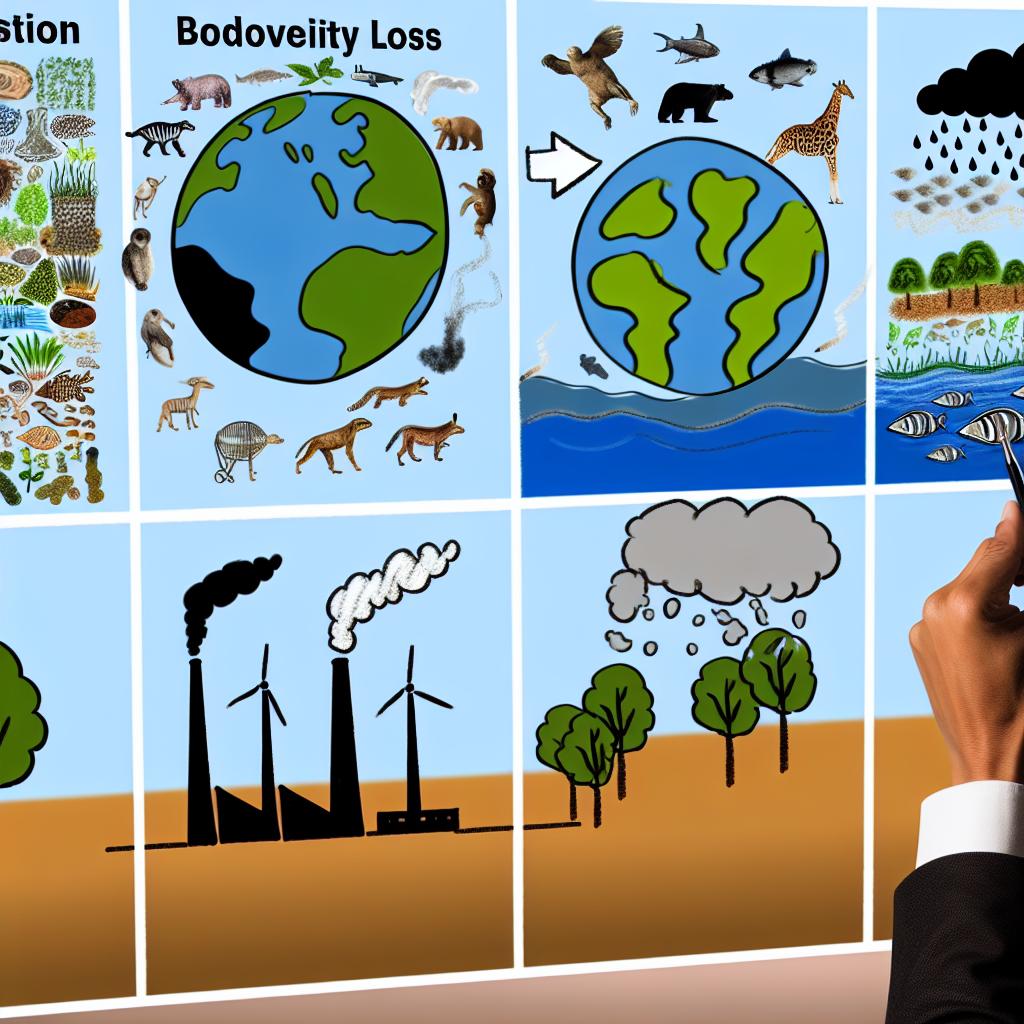- Introduction
- Impact on Biodiversity
- Climate Change Effects
- Pollution Issues
- Deforestation Crisis
- Conclusion
- FAQs
Introduction
In today's world, the environment is facing unprecedented challenges due to human activity. This article explores critical issues such as biodiversity loss, climate change, pollution, and deforestation. We will delve into how these problems arise, their impacts, and potential solutions.
Understanding the human impact on biodiversity is crucial as many species face extinction. Climate change effects manifest in extreme weather events and changing ecosystems, highlighting the urgent need for action. Pollution affects air, water, and soil quality, resulting in health crises. Deforestation continues to deplete our world's forests, contributing to environmental imbalance and biodiversity loss. By comprehending these challenges, we can move towards sustainable solutions.
Impact on Biodiversity
Biodiversity, the rich variety of life on Earth, is critical for the balance and health of ecosystems. Human activities such as urbanization, agriculture, and industrialization exert immense pressure on habitats, leading to habitat destruction and fragmentation. This results in a loss of biodiversity and risks the extinction of numerous species.
Furthermore, invasive species introduced by humans can outcompete native species, disrupting delicate ecosystems. Global warming further exacerbates these threats, altering habitats at rates too quick for many species to adapt. The decline in biodiversity means ecosystems become less resilient and more susceptible to shocks and changes, undermining essential services that nature provides, such as clean air and water, crop pollination, and nutrient cycling.
Efforts to conserve biodiversity are more important than ever. Sustainable practices, conservation projects, and legislation to protect natural habitats are crucial in mitigating biodiversity loss. Protecting the assortment of life on our planet ensures that ecosystems remain robust and capable of supporting diverse forms of life, including humans.
Climate Change Effects
Climate change represents one of the most significant environmental challenges today. It leads to global temperature rise, resulting in melting ice caps, rising sea levels, and altered precipitation patterns. These changes increase the frequency and intensity of natural disasters like hurricanes, floods, and droughts, posing severe threats to communities across the globe.
The impact on ecosystems is profound. Warming temperatures and changing climates force species to migrate, threatening their survival. Coral reefs, often referred to as aquatic rainforests, are dying due to ocean acidification and warming waters, impacting marine life that depends on them. Similarly, polar regions suffer from ice melting, affecting species like polar bears and seals.
Addressing climate change requires coordinated global efforts to reduce greenhouse gas emissions, increase reliance on renewable energy sources, and promote sustainability practices. International agreements, governmental policies, and individual actions all play crucial roles in combating this threat and protecting our planet's future.
Pollution Issues
Pollution affects every segment of the environment, from air and water to land and human health. Air pollution from vehicles, industries, and agriculture contributes to respiratory diseases and global warming. Water pollution from contaminants and plastic leads to the degradation of aquatic ecosystems and unsafe drinking water.
Land pollution, primarily through waste disposal and agricultural chemicals, impacts soil fertility and food security. The accumulation of pesticides and other pollutants bioaccumulate in the food chain, causing long-term ecological and health issues. Furthermore, noise and light pollution disrupt habitats and pose threats to wildlife.
Combating pollution involves stringent regulations, innovative technologies for waste management, and public awareness campaigns. Reducing, reusing, and recycling waste, transitioning to cleaner technologies, and reducing single-use plastics are actionable steps towards alleviating pollution's impact and safeguarding the environment and human health.
Deforestation Crisis
Deforestation remains a pressing concern, with forests being cleared for agriculture, logging, and urban development. This practice leads to habitat destruction, increases carbon emissions, and disrupts the water cycle. Forests, which serve as the lungs of the Earth, play a pivotal role in absorbing carbon dioxide and maintaining biodiversity.
The Amazon rainforest, known as the planet's green lung, and other significant forest areas are continually shrinking. This not only contributes to climate change but also displaces indigenous communities and wildlife. There are growing concerns about irreparable damage to ecosystems and the loss of invaluable medicinal plants and biodiversity.
Efforts to combat deforestation include reforestation projects, sustainable land management, and enforcing laws against illegal logging. Protecting forested areas is essential for supporting both local communities and the global environment. Support for ecoforestry initiatives and promoting the use of certified wood products are valuable tactics in addressing deforestation challenges.
Conclusion
The problems facing our planet are daunting, but awareness and action can drive positive change. By understanding the human impact on biodiversity, climate, pollution, and deforestation, we become better equipped to develop sustainable solutions for these issues. Collaborative efforts, innovation, and responsible management of resources are crucial to preserving our planet for future generations.
FAQs
What are the main causes of biodiversity loss?
The primary causes of biodiversity loss include habitat destruction due to agriculture, urbanization, introduction of invasive species, pollution, and climate change.
How does climate change affect human health?
Climate change affects human health through increased heatwaves, spread of infectious diseases, air pollution, and severe weather events that can lead to injuries and mental health issues.
What can individuals do to reduce pollution?
Individuals can reduce pollution by minimizing waste, using energy-efficient appliances, supporting clean energy sources, and participating in recycling programs.
Why is deforestation a global issue?
Deforestation is a global issue because forests play a critical role in regulating the climate, supporting biodiversity, and sustaining indigenous peoples and wildlife worldwide.
